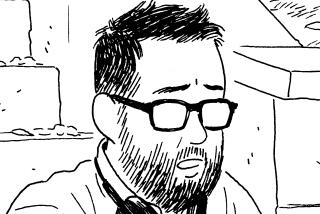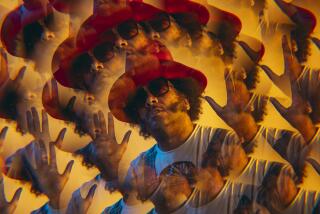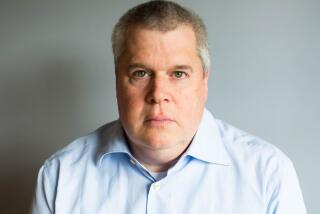A satirical genius flirts with disaster
- Share via
NEW YORK — From a distance, wearing plaid and slightly grizzled, Sam Lipsyte looks like a grumpy lumberjack -- although there are not many lumberjacks standing at the gate of Columbia University in Manhattan. And up close, it’s clear he’s not grumpy at all: Lipsyte has an air of restrained amusement that’s perfect for one of America’s best satiric writers.
His writing often features arrested-development characters similar to Judd Apatow’s heroes -- but Lipsyte’s guys don’t get gorgeous girls or happy endings. Their struggles end in failure, disaster or the mortifyingly banal. Lipsyte’s new short-story collection, “The Fun Stuff” (Farrar, Straus & Giroux, $24), includes an unpopular male doula, a forlorn high school wrestler, an underemployed nursery school aide with miserable romantic options, a junkie with a scheme to write a children’s book, and a guy with the idea to make an action movie who gets thrown off a roof by accident.
As the protagonist of his breakthrough 2004 novel, “Home Land,” puts it, “I did not pan out.” Everyone else tends to call his characters losers.
“On some level, they are,” he acknowledges over lunch in Manhattan. “But they’re suffering from a lot of the pressures coming from the outside, from the ways we’re taught to measure ourselves by the culture. We now have pretty fixed rules about what constitutes success and what doesn’t.”
In conversation, Lipsyte seems to simultaneously be participating in and observing the proceedings. When he says or hears something amusing there’s a split-second pause, as if the words are being registered, amplified, stored away a Lipsytian-view-of-the-world file. When he laughs, which is frequently, the laughter carries an extra layer of delight, at the moment itself and being able to see it clearly, another example of our silly human tragedy.
With a teaching job at Columbia, a wife, two kids and a great publisher, Lipsyte’s life is hardly tragic, but he has a deep understanding of what it’s like to be in different circumstances. “I think people are undone. They unravel; often what they do is inappropriate or mistimed or just badly executed, and they get themselves into more trouble.”
Like George Saunders, Lipsyte’s work gnaws on the mundane degradations of daily life, heightened by an absurd and amused point of view. But where a Saunders character might act nobly, a Lipsyte character will make the choice that is wrongheaded or driven by a base emotion like fear -- uncomfortable, perhaps, but also more true.
In “The Dungeon Master,” one story in his new collection, the game, which should be a fun-filled escapist fantasy, is as full of grinding misery as its players’ adolescent lives, thanks to the sadistic dungeon master. Lipsyte laughs as he recalls playing a similar D&D; game as a kid; he exaggerated its unpleasantness to create the story’s dark humor.
Lipsyte grew up in small-town New Jersey, son of sportswriter Robert Lipsyte and his wife, Marjorie, a journalist who published a novel. He went to Brown, where in classic Gen-X style he joined a confrontational art-rock band. After school, he moved to New York, where he got a low-paying job writing and editing for Feed, an Internet 1.0 online magazine.
During the day, he was in the online writing vanguard; at night, he worked on his literary fiction, with marginal success. He was in his late 20s, taking care of his mother, who was ill. “She was always the one who was behind me, encouraging me. When she died, she thought I was a struggling intern with literary ambitions,” he says. “That’s been the great, the bittersweet part of all of this -- she was the one who had the vision of me being able to do this, and she never got to see it.”
His first book was a short-story collection, “Venus Drive,” published by the independent Open City Press in 2000. Since then, he’s published three novels and “The Fun Parts,” been a Guggenheim fellow, sold a pilot to HBO (that did not pan out) and been lauded by critics. New Yorker editor David Remnick lamented that Lipsyte just failed to make the age cutoff for the magazine’s “20 under 40” writer showcase in 2010.
And yet. “I’m glad that it took 40 years to start publishing stories in the New Yorker, because I got to get a sense of who I was, and really develop what I was doing,” he says. “For a long time everything was really hard, and nothing came out the way I wanted it to.”
Then, one day: “I was writing something, and it seemed to flow in this very bountiful but controlled way. And I thought, ‘This is it, this is what they talk about. This is what it is to really be writing,’ ” he says. “It’s a wonderful zone to be in. It’s not always a clear indicator when you’re feeling great that you’re actually writing great. That zone of joy, the time standing still feeling -- that’s why you do it.”
--
More to Read
Sign up for our Book Club newsletter
Get the latest news, events and more from the Los Angeles Times Book Club, and help us get L.A. reading and talking.
You may occasionally receive promotional content from the Los Angeles Times.







